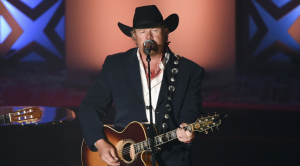
In the realm of country music, where narratives often revolve around themes of love, loss, and the American dream, Toby Keith emerged as a distinct voice, unafraid to challenge conventions and delve into provocative subject matter. One such song that exemplifies Keith’s rebellious spirit and penchant for pushing boundaries is “Who’s Your Daddy?” released in 2005 as the lead single from his album “Honky Tonk University.” This track ignited controversy and debate upon its release, sparking discussions about masculinity, patriotism, and the evolving landscape of country music.
Keith’s Musical Journey
Before delving into the intricacies of “Who’s Your Daddy?” it is essential to understand Toby Keith’s musical trajectory. Born in Clinton, Oklahoma, in 1964, Keith grew up immersed in the rich traditions of country and western music. He honed his songwriting and vocal skills while performing at local bars and honky-tonks. Keith’s breakthrough came in the late 1990s with hits like “The Thunder Rolls” and “How Do You Like Me Now?!” These songs established him as a prominent figure in the country music scene, known for his gritty vocals, catchy melodies, and relatable lyrics.
The Controversial Lyrics
“Who’s Your Daddy?” opens with a defiant declaration: “I’m a red, white, and blue kind of guy/I love my country, no apologies.” These lines immediately set the tone for a song that celebrates patriotism and traditional values. However, the lyrics soon take a more provocative turn as Keith questions the identity of a young man who claims to be a “bad ass.” He challenges the man’s masculinity and authority, ultimately suggesting that he may not be the father figure he portrays himself to be.
The chorus of “Who’s Your Daddy?” further amplifies the song’s confrontational nature: “Who’s your daddy?/I’m your daddy/You better step aside/I’m the baddest man alive.” Keith asserts his dominance and authority, positioning himself as the ultimate father figure. The lyrics can be interpreted as a metaphor for American exceptionalism, with Keith representing the nation’s strength and power.
Critical Reception and Debate
“Who’s Your Daddy?” received mixed reactions upon its release. Some critics praised the song for its unabashed patriotism and celebration of traditional masculinity. Others, however, condemned it for its aggressive tone and perceived misogynistic undertones. The song’s lyrics sparked debates about gender roles, cultural identity, and the changing face of country music.
Some interpreted “Who’s Your Daddy?” as a commentary on the anxieties and insecurities experienced by men in a rapidly changing society. The song’s confrontational nature can be seen as a defense mechanism against perceived threats to traditional masculinity. Others argued that the lyrics were simply a reflection of Keith’s own personal experiences and beliefs, and that the song should not be taken too seriously.
The Song’s Impact on Country Music
Regardless of its critical reception, “Who’s Your Daddy?” had a significant impact on country music. The song’s success solidified Keith’s status as a leading figure in the genre and helped to redefine the boundaries of country songwriting. Keith’s willingness to tackle controversial subjects and challenge the status quo inspired other artists to take risks and experiment with their music.
“Who’s Your Daddy?” also sparked a broader conversation about the role of country music in contemporary society. The song’s lyrics highlighted the tension between traditional values and the changing cultural landscape. It forced listeners to confront their own beliefs and biases about masculinity, patriotism, and identity.
Video
Conclusion
Toby Keith’s “Who’s Your Daddy?” remains a controversial and thought-provoking song. Its lyrics challenge traditional notions of masculinity, patriotism, and authority. The song’s impact on country music and its ability to spark debate underscore its enduring significance. Whether viewed as a celebration of traditional values or a critique of societal norms, “Who’s Your Daddy?” is a testament to Toby Keith’s unique voice and his ability to push the boundaries of country music.